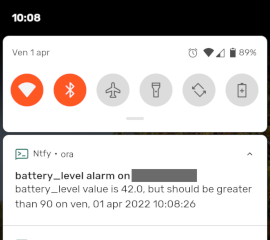🚨 HEALTHCHECK
A simple server health check. Allows to keep under control the machine vitals (cpu usage, raid status, thermals...) and alert the sysadmin in case of anomalies.
Sends an email and/or executes a command in case of alarm. As an example, the command may be a ntfy call to obtain a notification on a mobile phone or desktop computer. Meant to be run with a cron (see healthcheck.cron.example). Tested on Debian 11, but should run on almost any standard linux box.
Alarms
Provided ready-to-use alarms in config file:
- cpu load
- disk space
- raid status
- battery level / charger status (for laptops used as servers, apparently common among the self hosters)
- memory status
Alarms that need basic configuration to work on your system:
- cpu temperature (needs to be adapted as every system has a different name for the sensor)
- fan speed (needs to be adapted as every system has a different name for the sensor)
... or you can write your own custom alarm!
How does it work
The config file contains a list of checks. The most common checks are provided in the config file, but it is possible to configure custom checks, if needed. Every check definition has:
- DISABLED: boolean, wether to run the check
- ALARM_VALUE_MORE_THAN: float, the alarm is issued if detected value exceeds the configured one
- ALARM_VALUE_LESS_THAN: float, the alarm is issued if detected value is less than the configured one
- ALARM_VALUE_EQUAL: float, the alarm is issued if detected value is equal to the configured one (the values are always compared as floats)
- ALARM_VALUE_NOT_EQUAL: float, the alarm is issued if detected value is not equal to the configured one (the values are always compared as floats)
- ALARM_STRING_EQUAL: string, the alarm is issued if detected value is equal to the configured one (the values are always compared as strings)
- ALARM_STRING_NOT_EQUAL: string, the alarm is issued if detected value is not equal to the configured one (the values are always compared as strings)
- COMMAND: the command to run to obtain the value
- REGEXP: a regular expression that will be executed on the command output and returns a single group that will be compared with ALARM_*. If omitted, the complete command output will be used for comparation.
Installation
Copy the script and the config file into the system to check:
cp healthcheck.py /usr/local/bin/healthcheck.py
cp healthcheck.cfg.example /usr/local/etc/healthcheck.cfg
Make the script executable:
chmod +x /usr/local/bin/healthcheck.py
Edit /usr/local/etc/healthcheck.cfg enabling the checks you need and configuring email settings.
Run /usr/local/bin/healthcheck.py /usr/local/etc/healthcheck.cfg to check it is working. If needed, change the config to make a check fail and see if the notification mail is delivered. If you need to do some testing without spamming emails, run with the parameter --dry-run.
Now copy the cron file (it runs healthcheck every minute):
cp healthcheck.cron.example /etc/cron.d/healthcheck
For increased safety, edit the cron file placing your email address in MAILTO var to be notified in case of healthcheck.py catastrophic failure.
Setup is now complete: the cron runs the script every minute and you will receive emails in case of failed checks.
Useful notes
Note on system load averages**:
As stated in the uptime command manual:
System load averages is the average number of processes that are either in a runnable or uninterruptable state. A process in a runnable state is either using the CPU or waiting to use the CPU. A process in uninterruptable state is waiting for some I/O access, eg waiting for disk. The averages are taken over the three time intervals. Load averages are not normalized for the number of CPUs in a system, so a load average of 1 means a single CPU system is loaded all the time while on a 4 CPU system it means it was idle 75% of the time.
Note on temperature and fan speed checks:
The check to run needs lm-sensors to be installed and configured. Check your distribution install guide.
The sensors have different name in every system, so you WILL need to adapt the configuration.
Some systems have a single temperature sensors for the whole CPU, while some other has a sensor for every core. In this last case, you may want to copy the [cpu_temperature] config in N different configs like [cpu_temperature_0], one for every core, and change the REGEX to match Core 0, Core 1 and so on...

